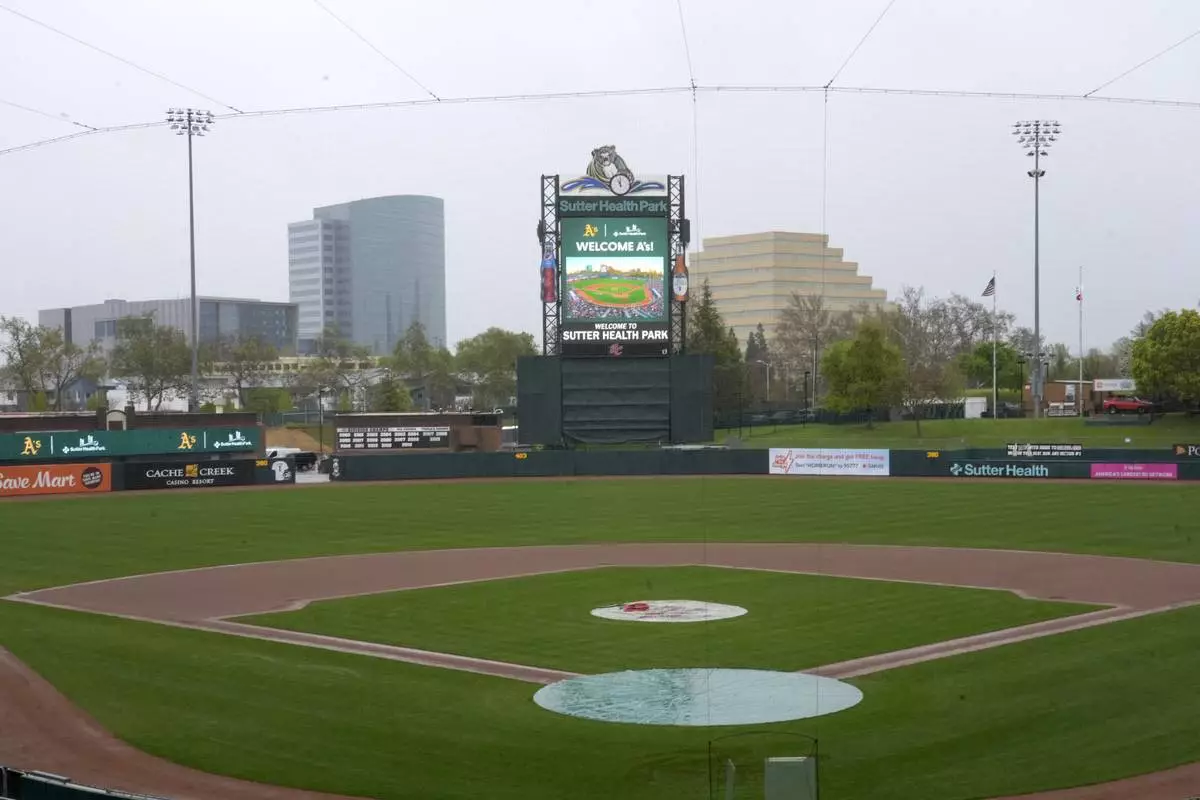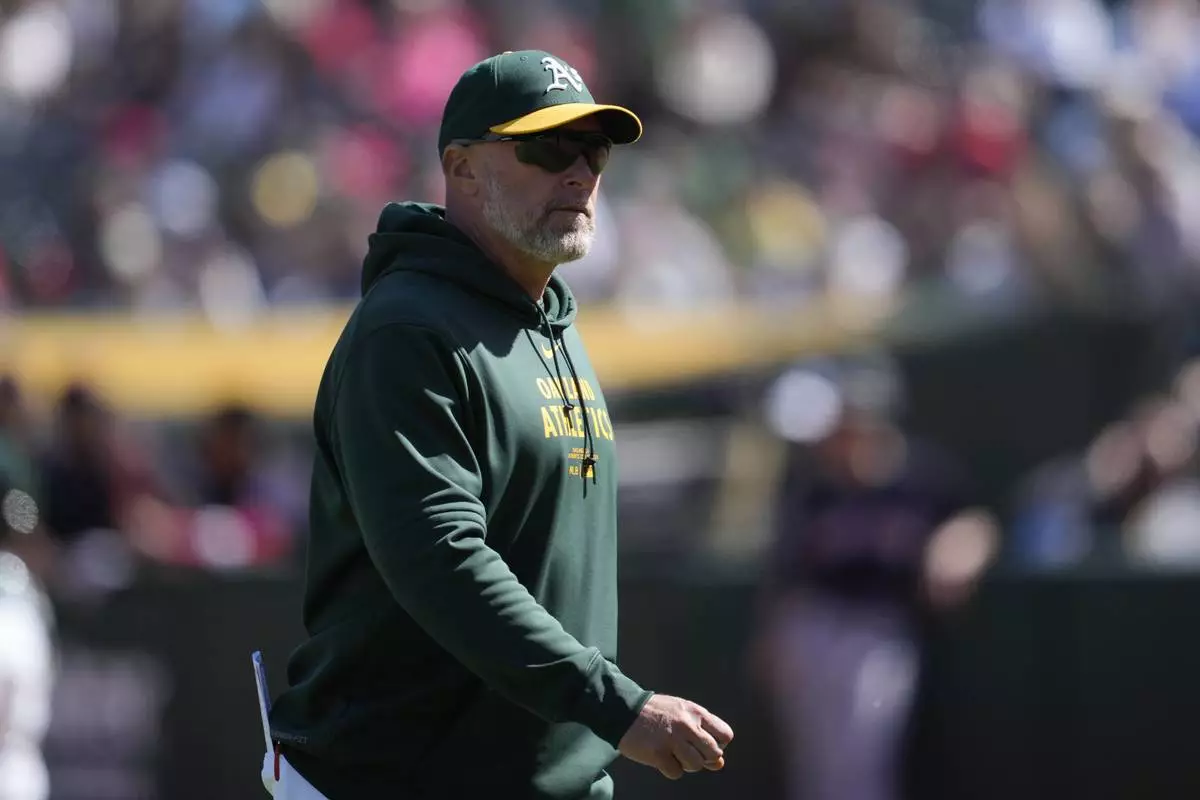On March 15, New Zealand changed. Some are calling it a loss of innocence, a reminder that distance doesn't bring protection against violence. Prime Minister Jacinda Ardern has vowed to change gun laws and investigate what went wrong. This is how 36 minutes of terror unfolded, according to witness accounts and livestream video.
1:32 p.m.
Ardern and about 30 other people get a chilling email from Brenton Tarrant. He has attached a manifesto filled with racism and hatred as he tries to justify why he is about to carry out a massacre.
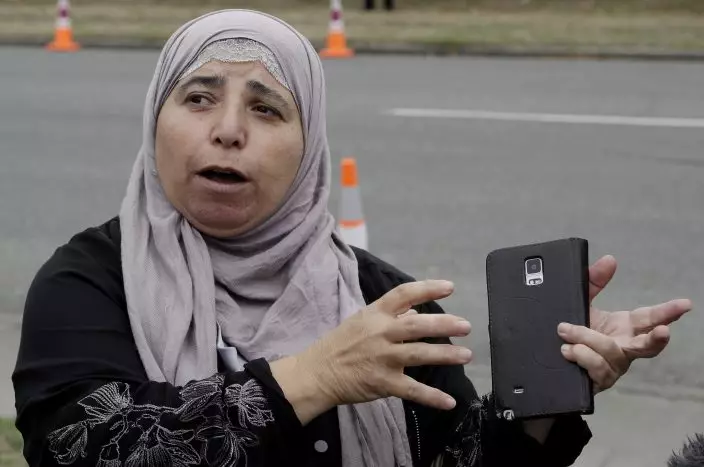
FILE - In this March 18, 2019, file photo, Al Noor mosque shooting survivor Kawthar Abulaban gestures as she explains escaping from the mosque to media in Christchurch, New Zealand. Abulaban was in the women’s prayer area with other women. She heard a single shot at first, enough for some of them to jump up and say, “What’s wrong?” Then there was a pause and a second shot and a dawning realization. Soon, there was a barrage of bullets. (AP PhotoMark Baker, File)
Its 74 pages are riddled with contradictions. He talks about the years he spent roaming the world and how "the varied cultures of the world greeted me with warmth and compassion."
Twelve pages in, he says he will target mosques in Christchurch and Linwood, as well as one in the town of Ashburton if he makes it that far.
Tarrant, a 28-year-old Australian who the prime minister says wasn't on the radar of the country's intelligence or law enforcement agencies and held a valid gun license, writes that he planned and trained for an attack for a couple of years after moving to the city of Dunedin, about a five-hour drive south of Christchurch.
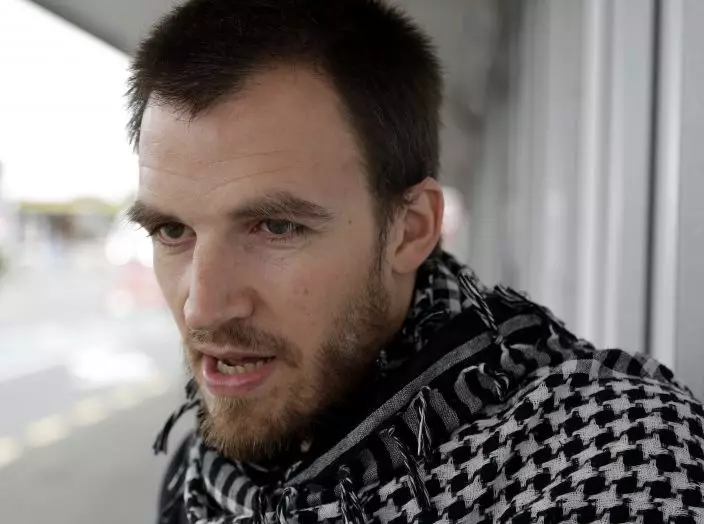
FILE - In this March 17, 2019, file photo, Linwood Mosque shooting survivor Elliot Dawson speaks near the mosque in Christchurch, New Zealand. Dawson was praying with about 80 others when he heard the first shots. No one reacted at first, because they were immersed in prayer. (AP PhotoMark Baker, File)
He says he settled on Christchurch because the mosque there, with its prominent golden dome, is busier and looks more distinctively foreign.
A member of Ardern's staff sees the email and, two minutes after it arrives, forwards it to parliamentary security. But Tarrant's plan is already in motion.
He is sitting in his gold Subaru station wagon in a parking area in a black paramilitary outfit. He turns on a helmet camera and begins an internet livestream.
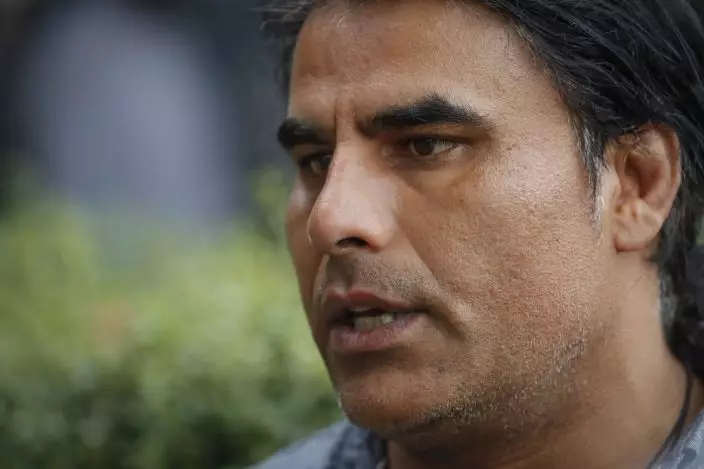
FILE - In this March 16, 2019, file photo, Abdul Aziz, survivor of mosque shooting speaks to Associated Press during an interview in Christchurch, New Zealand. Aziz is being hailed as a hero for preventing more deaths during Friday prayers at the Linwood mosque in Christchurch. (AP PhotoVincent Thian, File)
"Let's get this party started," he says.
1:41 p.m.
It's Friday prayers, and the Al Noor mosque is filled with people. The imam, Gamal Fouda, has just finished the Khutbah, a sermon delivered in Arabic. He is starting the next part in which he translates it into English. The Khutbah is the most serious part of the prayer, where rapt attention is required and the worshippers are silent.
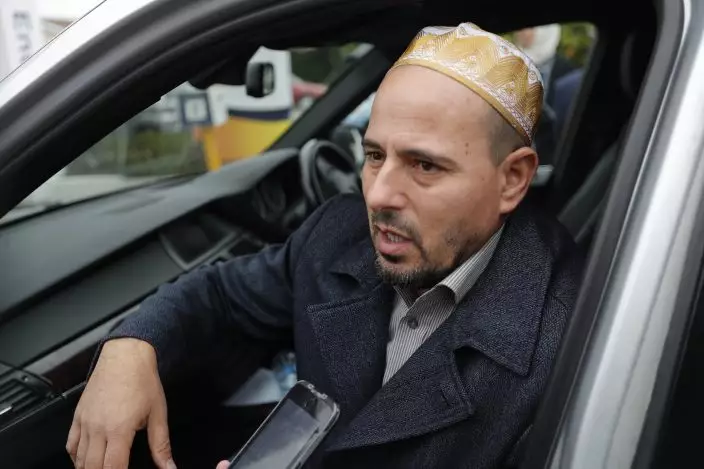
Gamal Fouda, the imam of Al Noor mosque, speaks after a special blessing ceremony near the site of Friday's shooting outside the Linwood Mosque in Christchurch, New Zealand, Monday, March 18, 2019. On Friday, Fouda had just finished the Khutbah, the formal sermon that’s delivered in Arabic, and he had started the next part in which he translated it into English. As the gunman approached the mosque, a man in the entrance called out cheerfully, “Hello, brother.” Brenton Tarrant fired several shots, one after another, and walked past the first bodies. (AP PhotoVincent Thian)
The sermon is about cooperating with each other, doing good and stopping evil.
As the gunman approaches the mosque, a man in the entrance calls out cheerfully, "Hello, brother." Tarrant fires nine shots, one after another, and walks past the first bodies.
Fouda hears shooting in the hallway and sees people start to run. He stops speaking. "It was chaos," he says.
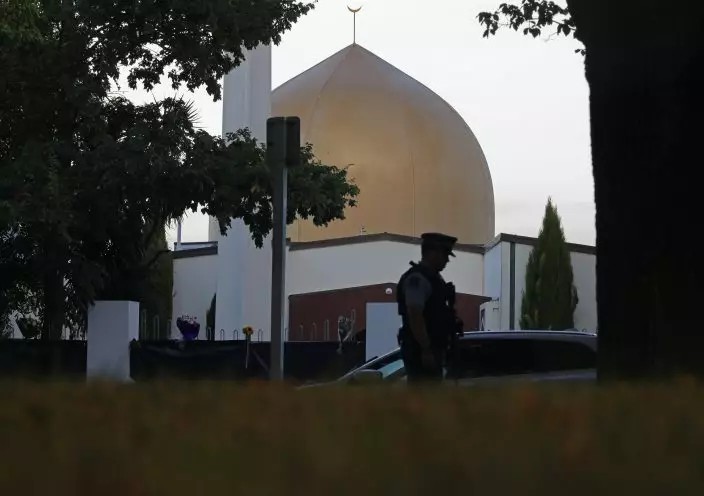
FILE - In this March 17, 2019, file photo, a police officer stands guard in front of the Al Noor mosque in Christchurch, New Zealand. On Friday, the imam, Gamal Fouda, had just finished the Khutbah, the formal sermon that’s delivered in Arabic, and he had started the next part in which he translated it into English. As the gunman approached the mosque, a man in the entrance called out cheerfully, “Hello, brother.” Brenton Tarrant fired several shots, one after another, and walked past the first bodies.(AP PhotoVincent Yu, File)
The gunman's livestream shows him moving into the main prayer room and firing at everyone he sees. It is a big room and has few exits.
An Algerian man smashes a window on one side of the room, Fouda says, and people start pouring out through the jagged glass. On the other side, the people there try to do the same. But the bodies begin piling up at the makeshift exits.
"And he was actually standing behind them, and he was shooting and shooting and shooting and shooting," Fouda says. "Tragedy. Tragedy."
Fifty-year-old Naeem Rashid, a teacher who moved to New Zealand from Pakistan with his family when he was 11, rushes up behind Tarrant, trying to grab the gun. Tarrant turns around and shoots him dead.
Asif Shaikh, 44, tries to run but falls in the crush of bodies. He thinks about trying to make it to the exit when he sees somebody else make the same move and get shot. So he lies there, next to an old man who has been shot in the thigh. They are exposed and uncovered, but somehow they survive. Days later he still can't sleep, the sounds of gunshots ringing in his head.
Kawthar Abulaban, 54, is in the women's prayer area with a couple of dozen other women. She hears a single shot at first, enough for some of them to jump up and ask, "What's wrong?" Then a pause and a second shot and a dawning realization. Soon, there is a barrage of bullets. Dozens upon dozens upon dozens.
The women scatter in all directions. Three huddle together in a cupboard in one of the bathrooms. But the shooter seems to be concentrating on shooting men, Abulaban says. She runs out of the mosque.
Tarrant walks outside, where he shoots people on the sidewalk. Children scream in the distance as he returns to his car to get another gun. He walks back inside the mosque and shoots again at motionless bodies on the floor, methodically firing bullets into them over and over.
He walks out again and shoots at a woman walking toward him on the street. She falls to the pavement and begs, "Help me! Help me!" before he shoots her again.
Since firing the first shot, the gunman has spent six minutes at the mosque. There are no sounds of sirens, no SWAT teams arriving. People are proud of New Zealand's friendliness. Unlike in most other countries, the police don't carry guns. They keep them in their cars for emergencies.
The worst mass shooting up until now was nearly 30 years ago in the small town of Aramoana, where a gunman killed 13 people following a dispute with a neighbor.
Tarrant gets back in his car. The song "Fire" by Arthur Brown blasts from the speakers, the singer declaring, "I am the god of hellfire!"
When Paul Bennett, an ambulance driver, arrives later, he sees blood flowing along the terra cotta tiles.
"There was a river of blood coming out of the mosque," he says.
1:48 p.m.
The shooter's rampage continues as he drives away from the Al Noor mosque. Yasir Amin and his father, Muhammad Amin Nasir, are walking along the sidewalk when a car stops and a man begins firing.
They run, but at 67, Nasir can't keep up with his son. As Amin turns to yell at his father to get down, he sees the older man has already been hit and is falling.
The gunman drives away. Nasir stares up at his son, unable to speak, blood pooling around his body. Amin grabs a phone from a nearby car and calls police. Father and son are taken to the hospital, where a critically wounded Nasir begins his recovery.
Neighbor Len Peneha helps several people who have escaped the mosque take shelter in his house until police arrive. He walks into the mosque and sees bodies everywhere.
"It's unbelievable nutty," he says. "I don't understand how anyone could do this to these people, to anyone. It's ridiculous."
The gunman speeds toward the Linwood mosque. There are no sirens. He stops as two people cross the road in front of his car, unaware that anything out of the ordinary is going on. He blasts his horn at them and continues.
There are so many bodies piled at the Al Noor mosque that it will take police more than a day to find one of them. In all, 42 people are dead there.
1:50 p.m.
Tarrant is speeding toward the Linwood mosque, weaving through traffic, blasting his music. It's been nine minutes since he fired his first shot. Finally, a single siren can be heard in the distance.
The gunman talks as he drives: "A lot of them survived, unfortunately. They all ran pretty quickly," he says. "The noise scared them. The women weren't in yet. I got the men first," he says, before the livestream cuts out.
1:55 p.m.
The Linwood mosque is about 5 kilometers (3 miles) from the Al Noor mosque but isn't as grand. It's a plain building in a poor neighborhood.
Inside, 33-year-old Elliot Dawson is praying with about 80 others when he hears the first shots. No one reacts at first because they're immersed in prayer.
Latef Alabi, who is leading the prayers, peeks out the window. When he sees Tarrant in his black gear and helmet, carrying a big gun, he thinks it's a police officer and isn't worried. Then he sees bodies and hears the man yelling obscenities.
"I realized this is something else. This is a killer," he says.
The gunshots continue. Dawson's friend goes outside and comes running back in: "Everyone, get down! Get down! Get down!"
Dawson hurries to a bathroom, huddles in a stall and climbs onto the toilet so his feet won't be visible. He tries to squeeze through a window but can't fit. He wonders if this is the moment his life will end.
Another man in the mosque, Abdul Aziz, picks up a hand-held credit card machine and rushes outside screaming, hoping to distract the attacker. As Tarrant runs back to his Subaru to get another gun, Aziz throws the machine at him.
Aziz's two younger sons are yelling at him to come back inside. Tarrant has gotten a gun and returns, firing at him. Aziz runs, zigzagging through cars in the driveway. He picks up a gun that Tarrant has tossed aside, aims and fires, but it's empty.
Tarrant runs back to his car again, probably to grab yet another weapon.
"He gets into his car and I just got the gun and threw it on his window like an arrow and blasted his window," Aziz said.
The windshield shatters: "That's why he got scared."
The gunman is cursing at him, yelling that he is going to kill them all. But he drives away, and Aziz chases the car down the street to a red light before it makes a U-turn and speeds away.
Seven people are dead at the Linwood mosque, a number many think could have been much higher if not for the actions of Aziz. One more person dies later at Christchurch Hospital and the death toll reaches 50.
Dawson says that someday, he hopes to come back to the mosque to pray again. He later stands on the street outside the mosque, holding a sign that reads, "We're all the same on the inside."
2:07 p.m.
Two police officers ram Tarrant's car, forcing it off the road, and drag him out. The next day he is charged with one count of murder, with more charges expected.
Many of the victims had moved to New Zealand to seek better lives in a country known for its beauty, friendliness and safety. Among the victims are engineers, business owners, students and a goalkeeper for the national futsal team. It is a modified form of soccer, typically played indoors.
The youngest of the victims is Mucaad Ibrahim, 3, who had big brown eyes and always seemed to be laughing. He had an intelligence beyond his years, a friend says. And he loved watching his big brother play soccer.





